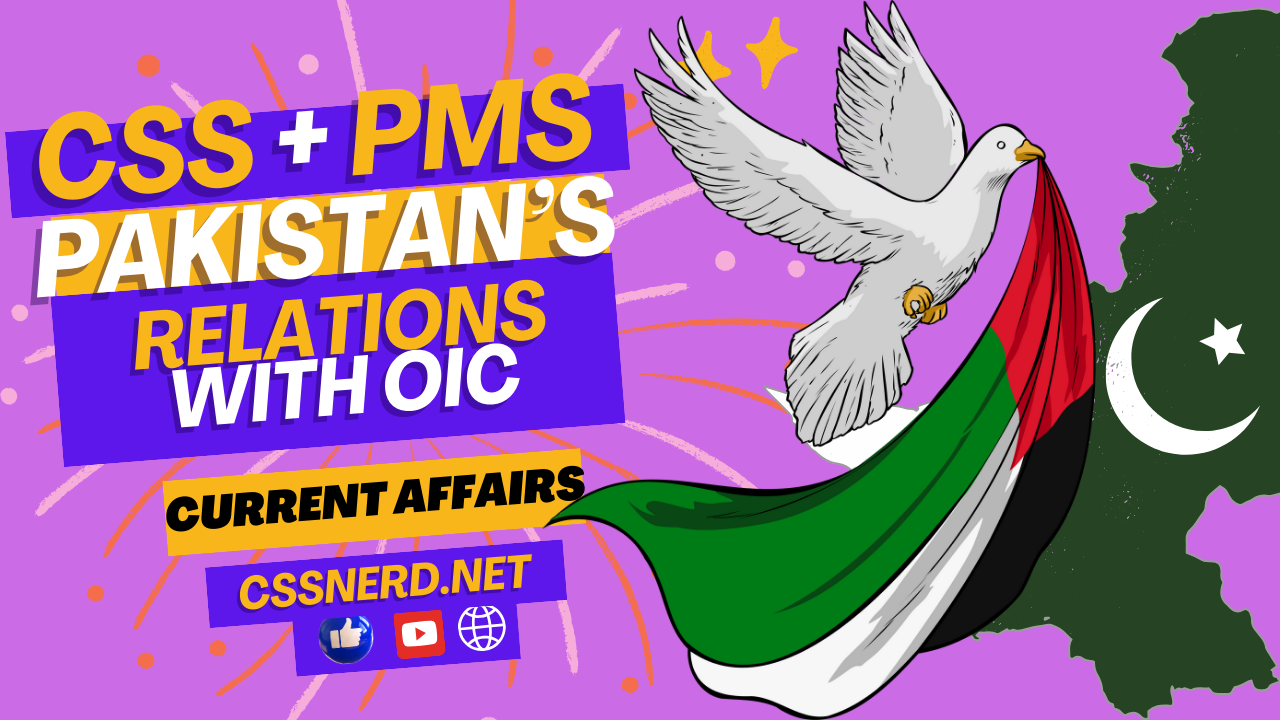PAKISTAN’S RELATIONS WITH ORGANIZATIONS – OIC
Introduction
The Organization of Islamic Cooperation (OIC) serves as a significant platform for fostering cooperation and solidarity among Muslim-majority nations worldwide. Pakistan, being a prominent member of the OIC, has maintained a robust relationship with the organization since its inception. This analysis delves into Pakistan’s multifaceted relationship with the OIC, examining the dynamics, challenges, achievements, and future prospects.
II. Historical Context:
Pakistan’s association with the OIC dates back to the organization’s establishment in 1969. The creation of the OIC was in response to various challenges faced by Muslim-majority countries, including political conflicts, socio-economic issues, and the plight of Muslim minorities. Pakistan played an instrumental role in the formation of the OIC and has been an active participant in its activities ever since.
III. Objectives within the OIC:
Pakistan’s engagement within the OIC aligns with its broader foreign policy objectives, which include
The Promotion of Islamic Solidarity: Pakistan aims to strengthen solidarity among Muslim-majority countries and promote cooperation on issues of common concern within the OIC framework.
Support for Muslim Causes: Pakistan advocates for the rights and interests of Muslims globally, including the resolution of conflicts, protection of Muslim minorities, and support for Palestine and Kashmir causes.
Diplomatic Outreach: The OIC provides Pakistan with a platform for engaging diplomatically with member states and advancing its interests on regional and international issues.
IV. Challenges and Opportunities:
Pakistan’s relations within the OIC face various challenges and opportunities:
Diverse Priorities: Member states of the OIC have diverse political, economic, and strategic interests, which sometimes lead to differences and disagreements within the organization.
Conflict Resolution: Ongoing conflicts and disputes among OIC member states, such as those in the Middle East and North Africa, pose challenges to consensus-building and cooperation within the organization.
Opportunities for Collaboration: Despite challenges, the OIC offers opportunities for collaboration on issues such as economic development, humanitarian assistance, and cultural exchange among Muslim-majority countries.
V. Key Achievements:
Pakistan has made significant contributions to the OIC’s objectives and activities:
Diplomatic Support: Pakistan has consistently supported OIC resolutions and initiatives on various issues, including the Palestinian cause, Kashmir dispute, and Rohingya crisis, reflecting its commitment to Islamic solidarity and justice.
Humanitarian Assistance: Pakistan has provided humanitarian assistance to OIC member states affected by conflicts, natural disasters, and other crises, demonstrating solidarity with Muslim communities in need.
Cultural and Educational Exchange: Pakistan has participated in OIC programs aimed at promoting cultural and educational exchange among member states, fostering greater understanding and cooperation within the Muslim world.
VI. Regional and International Dynamics:
Pakistan’s relations within the OIC are influenced by regional and international dynamics:
Geopolitical Considerations: Pakistan’s geopolitical position in South Asia and its strategic alliances shape its engagement within the OIC, particularly concerning issues such as the Kashmir dispute and relations with neighboring countries.
Saudi-Iran Rivalry: Tensions between Saudi Arabia and Iran have sometimes impacted the OIC’s functioning, as member states align themselves with one or the other, creating divisions within the organization.
Role in Islamic Affairs: Pakistan’s status as an Islamic republic and its historical ties to the a Muslim world confer it with a unique role and responsibility within the OIC, including promoting Islamic values and principles on the global stage.
VII. Future Prospects:
Looking ahead, there are opportunities for Pakistan to further enhance its relations within the OIC:
Conflict Resolution: Pakistan can continue to play a constructive role in facilitating dialogue and mediation efforts to resolve conflicts and disputes among OIC member states.
Development Cooperation: Strengthening economic cooperation and development initiatives within the OIC can contribute to the socio-economic advancement of Muslim-majority countries and foster greater stability and prosperity in the Muslim world.
Cultural Diplomacy: Leveraging cultural and educational exchange programs, Pakistan can promote greater understanding and solidarity among diverse Muslim communities within the OIC framework.
VIII. Conclusion:
Pakistan’s relations within the OIC are underpinned by a commitment to Islamic solidarity, cooperation, and support for Muslim causes globally. Despite challenges arising from regional conflicts, geopolitical rivalries, and diverse priorities among member states, Pakistan continues to play an active and influential role within the organization. By leveraging its diplomatic engagement, humanitarian assistance, and cultural diplomacy, Pakistan can contribute to advancing the OIC’s objectives and fostering greater unity and prosperity in the Muslim world.

